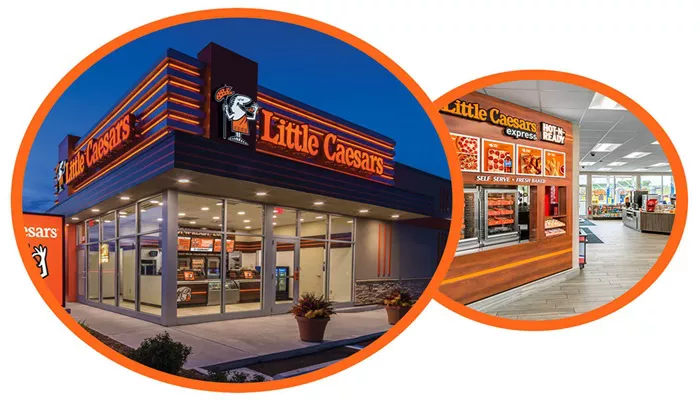Little Caesars, a well-known name in the pizza industry, has established itself as a leader in affordable and convenient pizza options. Founded in 1959 by Mike and Marian Ilitch in Detroit, Michigan, the franchise has grown to encompass over 4,000 locations worldwide. The brand is particularly recognized for its “Hot-N-Ready” pizzas, which allow customers to walk in and purchase fresh pizzas without waiting. As interest in franchising opportunities grows, many potential investors are keen to understand the costs involved in opening a Little Caesars franchise.
Initial Franchise Costs
Franchise Fee
The initial franchise fee for a Little Caesars franchise is typically $20,000. This fee grants franchisees the rights to use the company’s trademarked name and logos, as well as access to its established business model. Some variations of this fee may exist depending on specific circumstances or promotions, such as discounts for military veterans.
Total Investment
The total investment required to open a Little Caesars franchise ranges from $378,700 to $1,695,500. This broad range accounts for various factors including location, size of the restaurant, and whether the franchisee is starting from scratch or acquiring an existing location.
SEE ALSO: How Much Calories in Burger King Whopper?
Breakdown of Costs
Leasehold Improvements: These can vary significantly based on location but are often one of the largest expenses.
Equipment Costs: Essential equipment such as ovens and refrigerators can add up quickly.
Signage: Proper branding is crucial for visibility and customer attraction.
Initial Inventory: Franchisees need to stock up on ingredients and supplies before opening.
Licenses and Permits: Depending on local regulations, these can range from $1,000 to $20,000.
Liquid Capital And Net Worth Requirements
To qualify for a Little Caesars franchise, prospective owners must meet certain financial criteria:
Liquid Capital: A minimum of $150,000 in liquid assets is required. This ensures that franchisees have sufficient cash available for initial expenses and operating costs.
Net Worth Requirement: Franchisees must have a net worth of at least $350,000. This includes all personal assets that can be liquidated if necessary.
Ongoing Fees
Royalty Fees
Once operational, franchisees are required to pay ongoing fees that support the brand’s operations and marketing efforts:
Royalty Fee: Franchisees pay a royalty fee of 6% of gross sales or a minimum of $100 per week—whichever is greater. This fee contributes to ongoing support from the franchisor.
Advertising Fund Contribution: Additionally, there is typically a contribution of around 3-7% of gross sales towards national advertising campaigns.
Other Operating Expenses
In addition to royalty fees, franchisees should also budget for other recurring expenses:
Utilities: Monthly utility costs can range from $1,000 to $9,000 depending on location and size.
Insurance: Insurance coverage is essential for protecting the business and can cost between $1,200 and $2,000 annually.
Labor Costs: Hiring staff will also be a significant part of ongoing expenses.
Profitability Potential
Revenue Expectations
Little Caesars franchises have shown promising revenue potential. On average, each location generates about $1 million in gross sales annually. Profit margins typically hover around 17%, translating into potential annual profits of approximately $170,000 before taxes and other deductions.
Factors Influencing Profitability
Several factors can influence profitability for franchise owners:
Location: High foot traffic areas tend to yield better sales.
Operational Efficiency: Effective management of labor costs and inventory can enhance profitability.
Market Demand: Local demand for pizza and competition levels will also impact sales figures.
Earnings Variability
Earnings can vary widely among franchise owners based on their operational strategies and market conditions. While some owners report annual earnings ranging from $50,000 to $200,000, others may achieve higher profits by managing multiple locations or optimizing their business operations effectively.
Financing Options
Many prospective franchisees may not have all the capital upfront. Little Caesars offers financing options through approved lenders for qualified applicants. This allows new owners to secure loans based on their creditworthiness and business plan.
Typical Financing Structure
For example:
If the total investment is estimated at around $1 million, a typical financing structure might involve putting down about 20%, or $200,000, with the remainder financed through loans.
Monthly loan payments can vary based on interest rates but could be around $10,500 per month at 10% interest over ten years.
Conclusion
Investing in a Little Caesars franchise presents an exciting opportunity for aspiring entrepreneurs passionate about the food industry. With relatively low initial fees compared to other franchises and strong brand recognition, it offers a potentially lucrative business model. However, prospective owners must carefully assess their financial readiness and operational capabilities before embarking on this venture.
Related topics:
- The 5 Cheapest Restaurant to Franchise in 2024
- What Are The Main Ingredients in Tim Hortons’ Café Mocha
- What Is The Franchise Fee for Tim Hortons?

